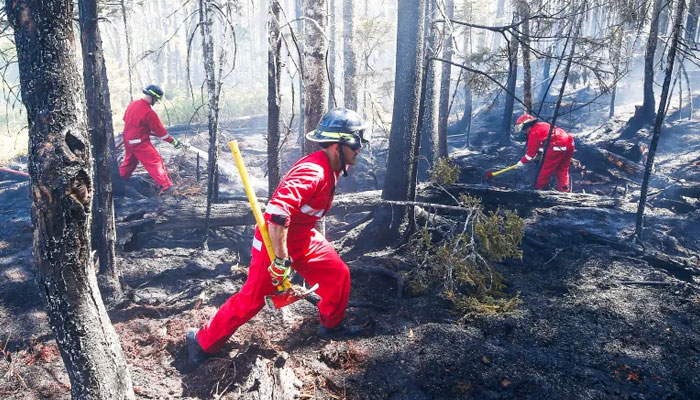USA's Midwest faces low air quality with Canadian wildfire smoke invasion
Smoke from Canadian wildfires has been carried by light winds and has settled over parts of Midwest, including Minnesota and Michigan
Millions of people in the Midwest are currently facing a serious air quality problem caused by smoke from wildfires in eastern Canada.
The smoke has spread over a large area, reaching as far south as the Carolinas. Air quality advisories have been issued in several regions, including southeastern Minnesota, parts of Michigan, and over 60 counties in Wisconsin.
The wildfires in Canada, particularly in the provinces of Quebec and Nova Scotia, have led to a significant increase in air pollution. In Quebec alone, around 14,000 people have been forced to evacuate, and over 150 fires are still burning. While one fire in Nova Scotia has been contained, another one covering nearly 100 square miles continues to burn out of control.
The smoke from these fires has been drifting across the northeastern United States and settling in the Midwest. This has prompted alerts warning of high levels of air pollution, especially for vulnerable groups such as children, older adults, and individuals with respiratory conditions like asthma.
Wildfire smoke contains tiny particles that can be harmful when inhaled. These particles, less than 2.5 micrometers in diameter, can penetrate the lungs and enter the bloodstream, causing inflammation and weakening the immune system. They can increase the risk of respiratory diseases, asthma, lung cancer, and other chronic lung conditions. Studies have also linked wildfire smoke exposure to increased risks of COVID-19 and influenza.
The situation in the Midwest highlights the long-term risks associated with wildfires, exacerbated by climate change. As the climate becomes warmer and drier, wildfires are more likely to occur and become more severe. The increase in wildfires over the past decade has resulted in a significant deterioration of air quality, impacting not only the immediate vicinity but also regions far downwind.
To monitor and assess the situation, the US Environmental Protection Agency, along with other agencies, maintains an interactive map called AirNow. This tool allows users to track active fires and evaluate local air quality conditions and associated risks.
Addressing this air pollution crisis requires collaborative efforts between the USA and Canada. As wildfires continue to pose risks to air quality, it is crucial to address climate change and work towards mitigating its effects to protect the health and well-being of communities on both sides of the border.
-
Late James Van Der Beek inspires bowel cancer awareness post death
-
Bella Hadid talks about suffering from Lyme disease
-
Gwyneth Paltrow discusses ‘bizarre’ ways of dealing with chronic illness
-
Halsey explains ‘bittersweet’ endometriosis diagnosis
-
NHS warning to staff on ‘discouraging first cousin marriage’: Is it medically justified?
-
Ariana Grande opens up about ‘dark’ PTSD experience
-
Dakota Johnson reveals smoking habits, the leading cause of lung cancer
-
Chris, Liam Hemsworth support their father post Alzheimer’s diagnosis












